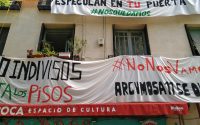Portugal // Professional firefighters chant “Don’t take our bread”~ 7 min
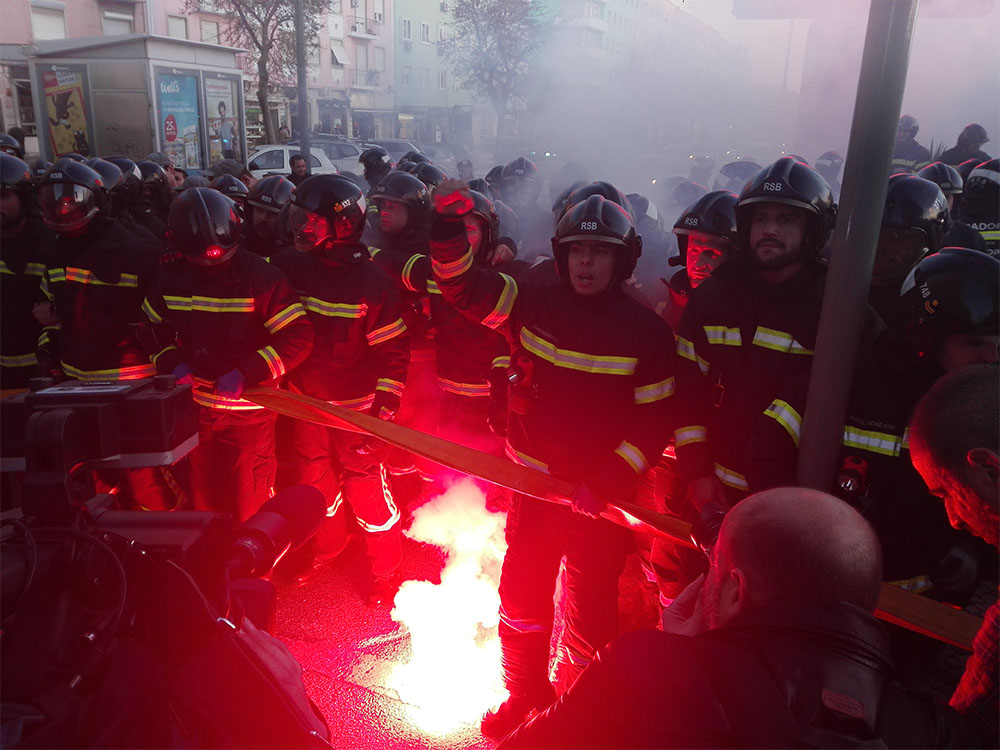
Yesterday’s afternoon in front of the Ministry of Labor was an interesting one. Professional firefighters from different national locations converged on Praça de Londres, called there by STAL (National Union of Local Administration Workers) and STML (Lisbon Municipal Workers’ Union) to contest the new regulations that the Socialist Party government is trying to impose on their profession.
Changes to the retirement age were by far what enraged participants the most. None of them could see themselves working until 60, perhaps even longer, under the strain inherent to the profession. How would they be able to haul 50 kilos of equipment on their backs while climbing 20 flights of stairs? How would they endure 12 hour shifts with two to three occurrences per shift, after 40 years of filling their lungs with soot and facing the flames and collapsing buildings in order to save lives? How would they be able to succor the population under such conditions?
The gathering started with a few speeches at the CGTP (General Confederation of Portuguese Workers) sound van. A union representative tried to get a few rhyming chants going, but the enthusiasm wasn’t there. It was then that the most popular chant of the day emerged from the audience: “Don’t take our bread!”.
The matter of remuneration is also important and underrated in a country where professionalism means swallowing all matter of indignities without protest instead of being a specialist to whom proper working conditions are given. A firefighter asked how he would be able to look his underpaid colleagues in the eye and demand from them the same efforts and sacrifices he demanded of others? The new salary proposals were not only undignified, they also represented a form of divide and conquer.
When the union representatives headed into the Ministry of Work with their demands, they were followed by the mass of firefighters. They gathered in front of the entrance in a light game of push and pull with police.
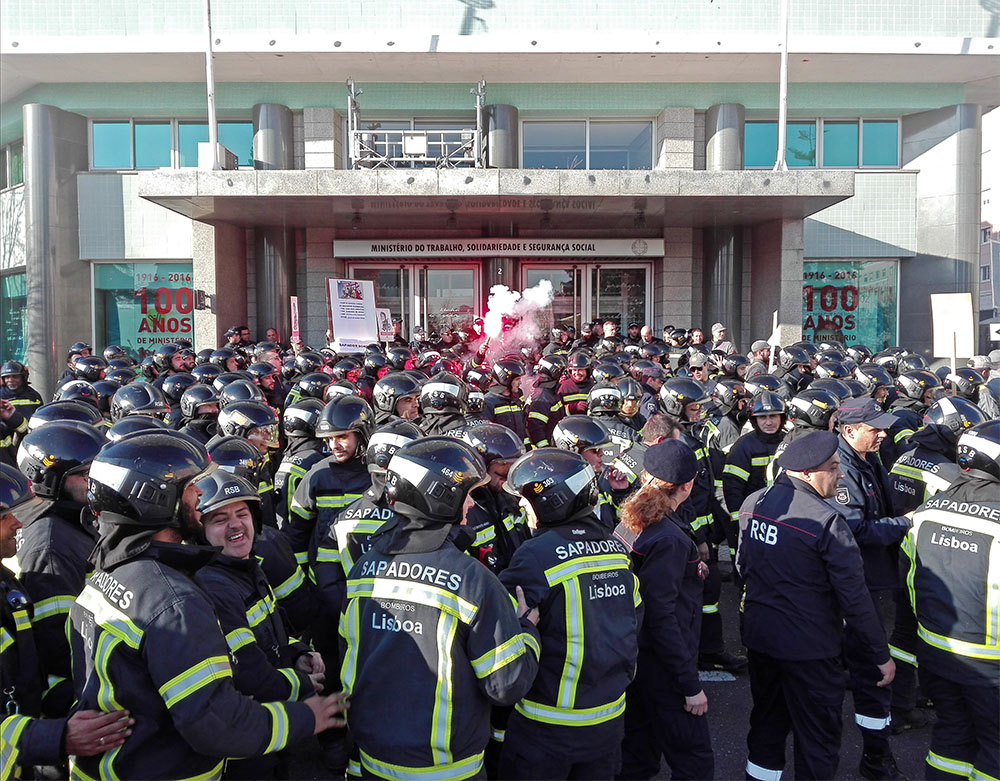
From there, it was a spontaneous jump into cutting the north entrance of the Praça de Londres. The malaise in the air turned into direct action. Some were shouting that they would not leave until they were properly received and listened to.
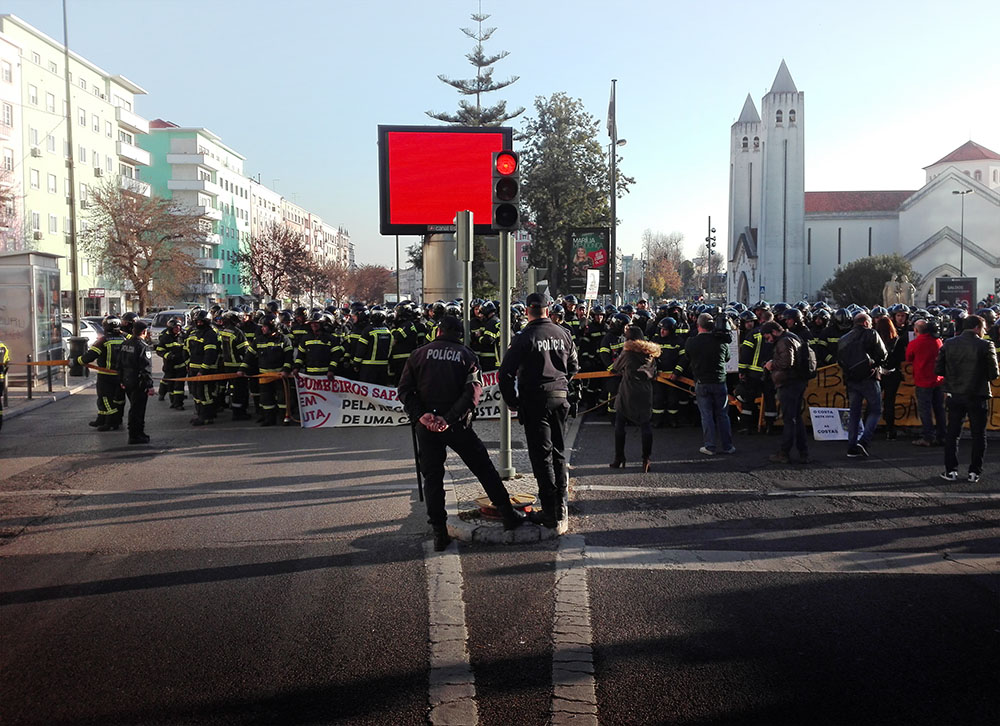
The feeling amongst firefighters was that they were the target of a profound ingratitude by those in power towards their work. While the country burns during the summer, they are the heroes of the hugging president and the prime-minister of the honeyed words. The media can’t praise them enough and ask of the population to donate them the shirt off their backs. By the time winter arrives, their salary is cut and they are asked to work under conditions that almost guarantee that someone will die. Perhaps such is the plan; after all, it would be one less pension on the budget.
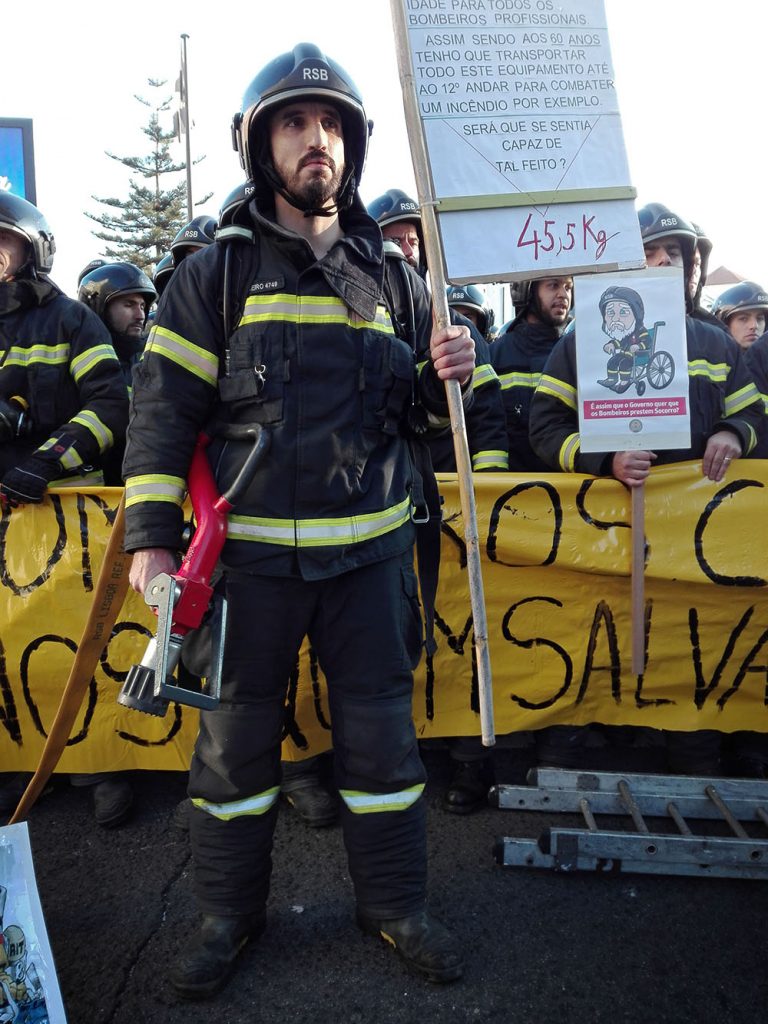
The media were sometimes antagonized. They worked for it. After all, when the professional firefighters launched a 15 day strike on non-crucial occurrences and first denounced this whole situation, no one gave a damn. When the media finally talked about the firefighters, it was only after what happened at Praça do Comércio.
Once more, they felt mocked. If they suffer peacefully, no one will listen to them. If they create a spectacle, TV crews rain from the skies. It was then unsurprising that amongst younger firefighters there was an attitude of “if that’s the only way they’ll listen, so be it!”. They were the ones most eager to extend the road cuts, the most impatient with the union’s pace of negotiations, the ones shouting for permanent strikes.
The older firefighters asked them to remain calm. That the confusion would attract cameras – but not to listen to them, only to denigrate them. An outraged firefighter shared an episode that seemed to encapsulate this theory. A journalist was interviewing one of his colleagues when one of the afternoon’s small confrontations started. The journalist immediately turned her back on the interviewee and went looking for headlines. The firefighter was left there, stupefied mid-sentence
One is left with the feeling that both sides amongst the firefighters are partially correct; a matter to be explored on another occasion.
As to the media, one gets suspicious that their attitude towards the firefighters is a consequence of the profound affection that the population has towards these professionals. Whenever strikes and demands emerge, they are to be attacked. Doctors, nurses, railway workers, teachers, dockers, they are all lazy and overpaid. Unlike the Correio da Manhã (the Portuguese Daily Mail) reader, who is the only honest Portuguese on the face of planet Earth and deserves each and every one of the euros he takes home.
But you can’t touch the firefighters. Not when you’ve spent half the year praising them as heroes. Not when everyone who sees them barrel down the road, sirens screaming, knows that they are on the way to save someone’s life. The testimonies of those who walked nearby attested to that. “When a fire starts at Marcelo’s or Costa’s house, show them this” said an old Alentejano (from southern Portugal) as he made a traditional rude gesture akin to flipping the bird. An old lady sorrowfully lamented that “They have to get to this point for anyone to listen to them, it’s a shame.”
A lone Correio da Manhã reader was the dissenting voice. “I work private! My salary is lower than yours!” in a common expression of Catholic miserabilism so typical of the Portuguese. The more you are kicked like a dog at work, the more the Gates of Heaven open wide.
But if media can’t touch the firefighters, the next best thing is to ignore them, which is what has happened.
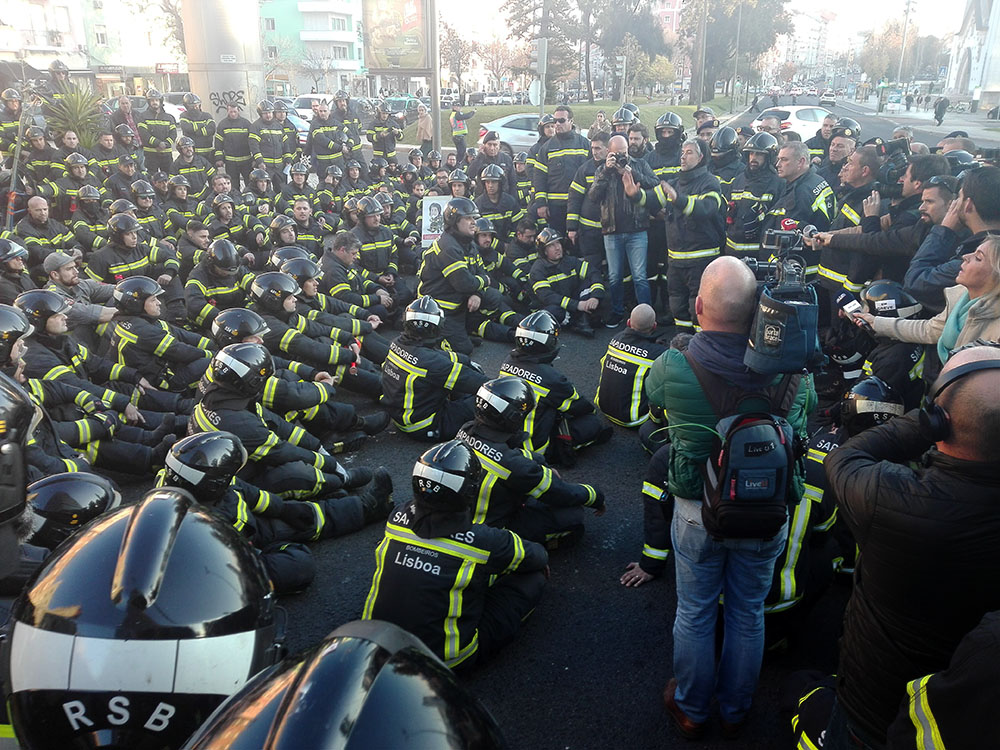
When the union representatives returned, a slight atmosphere of paranoia had settled in. Police had place plainclothes agents around the protesting firefighters dropping hints that the road block would be tolerated but that there would be trouble if they tried to circulate. Half a dozen police vans carrying riot police were the physical manifestation of “trouble”. It was when firefighters reoccupied one of the road sides that had been previously abandoned that confrontations were triggered after a plainclothes agent started pushing back. As journalists love to say “moments of tension were lived”.
To our amusement, a suspicious firefighter insisted on planting himself in front of us and taking our picture with a cellphone. After all, we had been “filming all afternoon!” and thus could only be undercover agents. No hard feelings, it’s not the first time it happens. Remain vigilant, comrade firefighter
The final dialog between representatives and represented isn’t easy. The news from the heights of the Ministry of Labor promise further meetings and conversations. It seems the government is very surprised by how its proposals have been received. It judged them good, just and moral. The younger firefighters are tired of waiting and of the cynical promises of those in power. The older ones ask them if they thought it would all be fixed in a couple of days. Those watching who want professional firefighters to emerge victorious are left with a sinking feeling. A bridge between parts seems to have gone missing.



